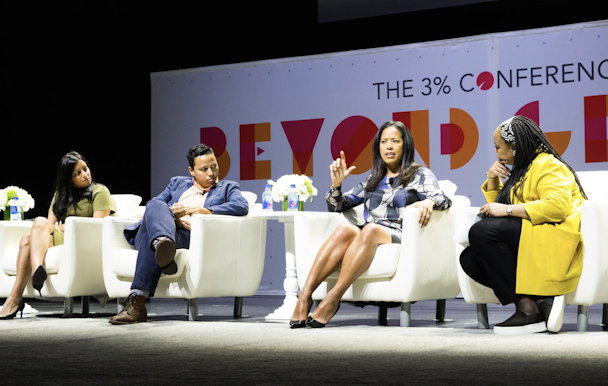Journalists discuss reporting as women of color at 3% Conference
The lack of diversity in journalism - particularly women of color - has long been an issue, and is one that still persists to this day. According to 2016 data from the American Society of News Editors, Hispanic, black and Asian women make up less than five percent of newsroom personnel at traditional print and online news publications.

Photo credit: Bronac McNeill Photography & Film
To hear the perspectives of two women of color who are on the front lines of journalism every day, the 3% Conference had HuffPost editor-in-chief Lydia Polgreen and The Guardian political reporter Sabrina Siddiqui discuss their experiences during a panel at the event. The two were joined by Michelle Ebanks, president of Essence.
Moderated by Judy Jackson, Wunderman global chief talent officer, Polgreen started things off by explaining that women of color have historically been poorly represented in the media and not taken seriously, pointing to the example of Anita Hill, who was criticized and dismissed when she accused Supreme Court nominee Clarence Thomas of sexual harassment as a young Yale Law School graduate in 1991.
Polgreen also brought up to the more recent example of Democratic congresswoman Frederica Wilson, who was lambasted and called “wacky” by President Trump after she criticized his handling of a military condolence call.
“The fact that you can take those two examples and that are so far apart in time and show the language that is acceptable to speak about women of color tells the whole story,” she said. “We have come a long way in a lot of different ways, but the reality is that women of color, in particular black women, are the object of caricature.”
Later in the panel, Siddiqui shared her experience of being one of the only Muslim reporters to cover the campaign trail leading up to the 2016 election, and having to balance the objective tendencies of her job with her personal identity and beliefs. She brought up once instance where she was at a press conference with Florida Sen. Marco Rubio the day after he’d criticized President Barack Obama’s visit to a mosque, and was planning to ask him why he’d taken issue with it.
But at the last minute she decided not to, not wanting to be the “Muslim reporter asking the Muslim question.” She also assumed another reporter would end up asking it any way since Rubio’s comments were dominating headlines.
However, no one ended up asking about it. She said this experience was a "learning lesson" for her since it made her realize that her voice matters and that she can't rely on others to ask these sorts of questions.
Polgreen echoed Siddiqui's sentiment, stating that women of color shouldn't avoid bringing their "whole selves" to their reporting out of fear of being accused of bias.
“In some cases, if we don’t bring our whole selves, then the questions that need to get asked won’t get asked," she said. "We all bring with us our stories, our histories, our experiences, to everything we do. I approach my work as an honest journalist, as someone who listens [and] who is open-minded. [But] I can't disown my African heritage. I can’t disown my sexual orientation any more than a white person or a straight person or a man could. The assumption that a person who comes from a 'minority' background is somehow bringing bias to [reporting] is kind of crazy.”
In light of the myriad of sexual harassment allegations that have come out against the likes of Harvey Weinstein, Kevin Spacey and journalist Mark Halperin in recent weeks, Polgreen also encouraged women to not be afraid to speak up and to support one another.
“We’re in a moment where powerful, powerful institutions and people are being called into question in ways they never have been before” she said. “This is our time. Let's do this. On the topic of sexual harassment in particular, shame is the tool of the patriarchy. Don’t feel shame. It’s not your fault.”
Wunderman proudly supports The Drum’s 3% Conference coverage. We believe true diversity does not check boxes, it checks itself. http://wunderman.com/


